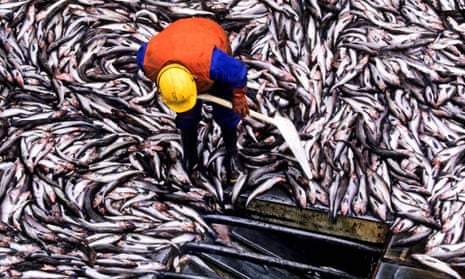Eighteen countries are underwriting the “plunder of the high seas” on an industrial scale through government hand-outs to fishing fleets, an international commission has found.
The hand-outs, in the form of fuel subsidies, have enabled fleets to strip the high seas of tuna and other fish stocks, and threaten global food security, the commission said in a report to be released on Tuesday.
The report from the Global Ocean Commission will urge governments to phase out fuel subsidies over the next five years to give stocks time to recover.
It will also call on governments to crack down on illegal fishing, and discourage use of plastics to curb ocean pollution.
“We should end subsidies for high seas fishing,” David Miliband, the former UK foreign secretary and co-chair of the commission, told The Guardian. “When it comes to subsidies for industrial-scale resource extraction, like industrial fishing on the high seas, we are doing a huge disservice to future generations.”
The commission, made up of former leaders such as Miliband, the former Costa Rican president, José María Figueres, and the former South African finance minister, Trevor Manuel, will also urge the United Nations to adopt ocean protection as a goal when that body meets in September.
Barack Obama said last week he planned to create the world's largest marine reserve in the south-central Pacific to protect coral reefs, whales, and countless fish species. Obama also pledged to crack down on pirate fishing fleets, and seafood fraud in American grocery chains.
The commission is focused further offshore: on the high seas, the 65% of the ocean surface that is beyond national boundaries.
“This was virgin territory 35 or 40 years ago,” said David Miliband. “The technological changes combined with subsidies and the demand from a growing population has turned what had for millennia been virgin territory into plundered territory.”
He said the high seas amounted to the world's biggest “failed state”.
The commission said in its report that industrial-scale fleets dominated the high seas, crowding out smaller operations from developing countries and fishing at an unsustainable pace – enabled by generous fuel subsidies.
The Spanish government led the world with those subsidies, providing some $1073 million in fuel subsidies for a catch of $2625 million, the report found. But France, Britain, Denmark and Italy were also heavily subsidising fuel costs for their fishing fleets.
Japan, South Korea, and the Phillipines also under-wrote fuel costs for their fleets on the high seas, as did the United States. American subsidies amounted to $137 million on a catch worth $368 million.
Some 87% of the fish species on the high seas were now over-fished or at the point of collapse, the report said. “The new data we are publishing shows that if it wasn't for subsidies high seas fishing wouldn't be profitable,” Miliband said. “It is effectively the industrialised world that is granting the biggest subsidies and getting the most out of the high seas subsidies.”
The other big threat to the high seas was from illegal fishing, and the report urged governments to track fishing boats through vessel numbers, as is the practice for other maritime traffic. It also urged governments to ban trans-shipment of catch at sea, a measure that would make it aid traceability of seafood.
The report said governments should cap and eventually phase out fuel subsidies over five years. If oceans continue to decline governments should consider banning industrial fishing on the high seas entirely, the report said.
Government should also put into place protections from oil and gas drilling, the report said.
Campaigners said they hoped the roster of former high-level officials on the commission would have the clout and connections to push governments into action. John Podesta, an advisor to Obama, was a member of the commission until his appointment earlier this year.
The findings were endorsed by the Oceana conservation group which said fuel subsidies were unfair to the fishing fleets from smaller countries. “A lot of these boats wouldn't be economic without the big subsidies that a lot of countries give to get them way in the middle of the ocean,” said Courtney Sakai, chief of staff for Oceana.




Comments (…)
Sign in or create your Guardian account to join the discussion